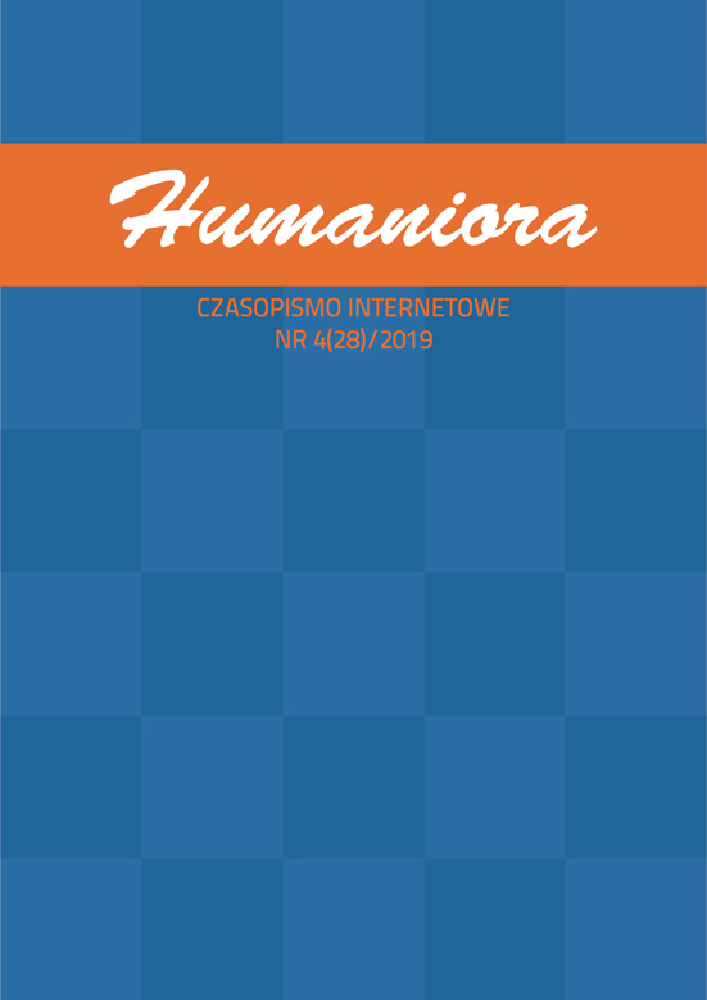Abstrakt
In 1705, the book titled Occasional Thoughts in Reference to a Vertuous or Christian Life was edited. Damaris Masham (1659–1708), the author of this writing, the daughter of Ralph Cudworth and the friend of John Locke presents in the work her view on women’s education. This article examines the elements of rational reflection upon the world and the concept of a human being, which has led Masham to a radical for her contemporaries conclusion that the proper women’s education should be necessary. Masham’s arguments refer to the equality of people as rational creatures of God, their desire for salvation, defence of faith, and conveying religious teachings, but also they appeal to the significance of women’s social roles as a wife and a mother.
Bibliografia
A History of Women Philosophers. Volume III: Modern Women Philosophers, 1600–1900, Ed. Mary Ellen Waithe, Kluwer Academic Publishers, Dordrecht/Boston/London 1991.
Ballard G., Memoirs of Several Ladies of Great Britain, Who Have Been Celebrated for Their Writings Or Skill in the Learned Languages Arts and Sciences, printed by W. Jackson, Oxford 1752.
Boyer A., The History of the Reign of Queen Anne. Digested into Annals. Year the Third, A. Roper, London 1705.
Broad J., A Woman’s Influence? John Locke and Damaris Masham on Moral Accountability, „Journal of the History of Ideas” Vol. 67, No. 3 (Jul. 2006).
Broad J., Women Philosophers of the Seventeenth Century, Cambridge University Press, Cambridge 2004.
Fox Bourne H.R., The Life of John Locke. In Two Volumes, t. 2, Harper & Brothers Publishers, New York 1876.
Lascano Marcy P., Damaris Masham and „the Law of Reason or Nature”, „The Modern Schoolman” 88(3/40)/2011.
Locke J., Myśli o wychowaniu, tłum. Feliks Wnorowski, Zakład Narodowy Imienia Ossolińskich Wydawnictwo Polskiej Akademii Nauk, Wrocław – Kraków 1959.
Locke J., Rozważania dotyczące rozumu ludzkiego, t. 2, tłum. B.J. Gawecki, PWN, Warszawa 1955.
Locke J., The Reasonableness of Christianity as Delivered in the Scriptura, Printed for Awnsham and John Churchil, at the Black Swan in Pater-noster-row, London 1695.
Locke J., Some Thoughts Concerning Education, Printed for A. and J. Churchill at the Black Swan in Pater-noster-row, London 1693.
[Masham D.], Occasional Thoughts in Reference to a Vertuous or Christian Life, printed for A. and J. Churchil at the Black Swan in Pater-noster Row, London 1705.
Pylades and Corinna: or; Memoirs of the Lives, Amours, and Writings of Richard Gwinnett and Mrs. Elizabeth Thomas, Edmund Curll, London 1731.
Schurman A.M. van, Dissertatio de ingenii muliebris ad doctrinam et meliores litteras aptitudine. Accedunt quaedam epistolae, eiusdem argumenti, Ex Officina Elseviriana, Lejda 1641.
Schurman A.M. van, Problem praktyczny: Czy chrześcijańskiej kobiecie przystoi zamiłowanie do studiowania nauk?, przekład i opracowanie Joanna Usakiewicz, „Studia z Historii Filozofii” 1(10)/2019.
The Correspondence of John Locke. In Eight Volumes, t. 2, ed. Esmond Samuel de Beer, At the Clarendon Press, Oxford 1976.
The Works of John Locke, in Nine Volumes, The Twelfth Edition, t. 8, printed for C. and J. Rivington, T. Egerton, J. Cuthell, J. and A. Arch, Longman and Co., T. Cadell, J. Richardson, J. and W.T. Clarke, J. Mawman, Baynes and Son, Harding and Co., Baldwin and Co., Harvey and Darton, R. Scholey, J. Bohn, J. Collingwood, T. Tegg, G. and W.B. Whittaker, G. Mackie, W. Mason, Hurst, Robinson and Co., J. Hearne, J. Brumby, Simpkin and Marshall, S. Prowett, W. Pickering, R. Saunders, J. Parker, Oxford, and Stirling and Slade, Edinburgh, London 1824.
The Works of Mrs. Catharine Cockburn, Theological, Moral, Dramatic, and Poetical…, t. 2, ed. by Thomas Birch, printed for J. and P. Knapton, London 1751.
Thoughts on Christian Life by John Locke, T. Waller, London 1747.
Usakiewicz J., Anna Maria van Schurman (1607–1678) – Ocellus Niderlandów, „Studia z Historii Filozofii” 1(10)/2019.
Usakiewicz J., Damaris Masham, jej związki z Johnem Lockiem i dyskusja z Gottfriedem Wilhelmem Leibnizem, “Studia z Historii Filozofii” 3(9)/2018.
Licencja
Czasopismo oraz wszystkie zamieszczone w nim materiały są powszechnie dostępne i mogą być wykorzystywane do celów naukowych, edukacyjnych, poznawczych i niekomercyjnych bez konieczności uzyskiwania każdorazowej zgody autorów i redakcji. Nadesłanie artykułu do publikacji traktowane jest jako zgoda autora na udostępnienie swojej pracy i informacji w niej zawartych do powyżej wymienionych celów. W takich przypadkach należy jedynie wskazać źródło, z którego zaczerpnięte zostały informacje. Pobieranie opłat za dostęp do materiałów zawartych w czasopiśmie lub ograniczanie do niego dostępu jest zabronione.
Przesyłane do redakcji teksty muszą stanowić oryginalne prace, uprzednio nigdzie niepublikowane ani nie przedkładane innym redakcjom lub wydawcom. Autorzy nadsyłanych artykułów ponoszą odpowiedzialność za uzyskanie zezwoleń na publikowanie materiałów, do których prawa autorskie są w posiadaniu osób trzecich. Publikacja materiałów chronionych prawem autorskim jest możliwa pod warunkiem uprzedniego dostarczenia przez autora do redakcji pisemnej zgody właściciela praw autorskich.





